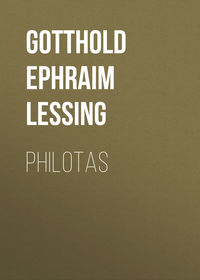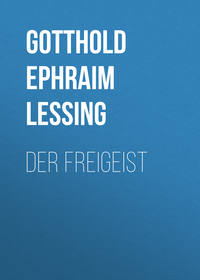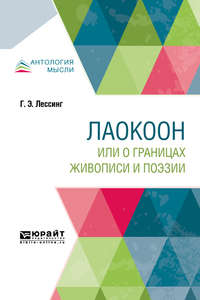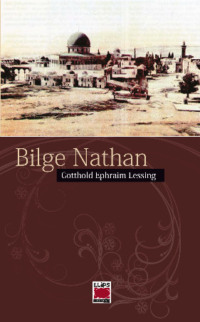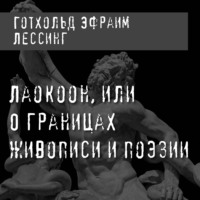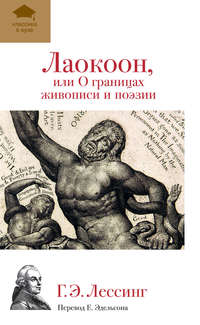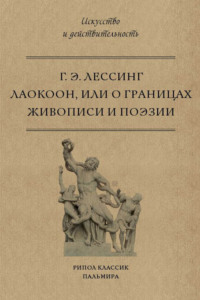Nathan the Wise; a dramatic poem in five acts
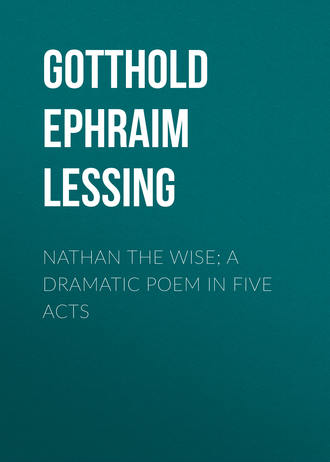 полная версия
полная версияNathan the Wise; a dramatic poem in five acts
Жанр: зарубежная драматургиязарубежная классиказарубежная старинная литературапьесы и драматургиясерьезное чтениепьесы, драматургия
Язык: Английский
Год издания: 2019
Добавлена:
Настройки чтения
Размер шрифта
Высота строк
Поля
Scene.—A Place of Palms
The Templar walking to and fro, a Friar following him at some distance, as if desirous of addressing him.
TEMPLARThis fellow does not follow me for pastime.How skaunt he eyes his hands! Well, my good brother—Perhaps I should say, father; ought I not?FRIARNo—brother—a lay-brother at your service.TEMPLARWell, brother, then; if I myself had something—But—but, by God, I’ve nothing.FRIAR Thanks the same;And God reward your purpose thousand-fold!The will, and not the deed, makes up the giver.Nor was I sent to follow you for alms—TEMPLARSent then?FRIAR Yes, from the monastery.TEMPLAR WhereI was just now in hopes of coming inFor pilgrims’ fare.FRIAR They were already at table:But if it suit with you to turn directly—TEMPLARWhy so? ’Tis true, I have not tasted meatThis long time. What of that? The dates are ripe.FRIARO with that fruit go cautiously to work.Too much of it is hurtful, sours the humours,Makes the blood melancholy.TEMPLAR And if IChoose to be melancholy—For this warningYou were not sent to follow me, I ween.FRIAROh, no: I only was to ask about you,And feel your pulse a little.TEMPLAR And you tell meOf that yourself?FRIAR Why not?TEMPLAR A deep one! troth:And has your cloister more such?FRIAR I can’t say.Obedience is our bounden duty.TEMPLAR So—And you obey without much scrupulous questioning?FRIARWere it obedience else, good sir?TEMPLAR How is itThe simple mind is ever in the right?May you inform me who it is that wishesTo know more of me? ’Tis not you yourself,I dare be sworn.FRIAR Would it become me, sir,Or benefit me?TEMPLAR Whom can it become,Whom can it benefit, to be so curious?FRIARThe patriarch, I presume—’twas he that sent me.TEMPLARThe patriarch? Knows he not my badge, the crossOf red on the white mantle?FRIAR Can I say?TEMPLARWell, brother, well! I am a templar, takenPrisoner at Tebnin, whose exalted fortress,Just as the truce expired, we sought to climb,In order to push forward next to Sidon.I was the twentieth captive, but the onlyPardoned by Saladin—with this, the patriarchKnows all, or more than his occasions ask.FRIARAnd yet no more than he already knows,I think. But why alone of all the captivesThou hast been spared, he fain would learn—TEMPLAR Can IMyself tell that? Already, with bare neck,I kneeled upon my mantle, and awaitedThe blow—when Saladin with steadfast eyeFixed me, sprang nearer to me, made a sign—I was upraised, unbound, about to thank him—And saw his eye in tears. Both stand in silence.He goes. I stay. How all this hangs together,Thy patriarch may unriddle.FRIAR He concludes,That God preserved you for some mighty deed.TEMPLARSome mighty deed? To save out of the fireA Jewish girl—to usher curious pilgrimsAbout Mount Sinai—to—FRIAR The time may come—And this is no such trifle—but perhapsThe patriarch meditates a weightier office.TEMPLARThink you so, brother? Has he hinted aught?FRIARWhy, yes; I was to sift you out a little,And hear if you were one to—TEMPLAR Well—to what?I’m curious to observe how this man sifts.FRIARThe shortest way will be to tell you plainlyWhat are the patriarch’s wishes.TEMPLAR And they are—FRIARTo send a letter by your hand.TEMPLAR By me?I am no carrier. And were that an officeMore meritorious than to save from burningA Jewish maid?FRIAR So it should seem; must seem—For, says the patriarch, to all ChristendomThis letter is of import; and to bear itSafe to its destination, says the patriarch,God will reward with a peculiar crownIn heaven; and of this crown, the patriarch says,No one is worthier than you—TEMPLAR Than I?FRIARFor none so able, and so fit to earnThis crown, the patriarch says, as you.TEMPLAR As I?FRIARThe patriarch here is free, can look about him,And knows, he says, how cities may be stormed,And how defended; knows, he says, the strengthsAnd weaknesses of Saladin’s new bulwark,And of the inner rampart last thrown up;And to the warriors of the Lord, he says,Could clearly point them out;—TEMPLAR And can I knowExactly the contents of this same letter?FRIARWhy, that I don’t pretend to vouch exactly—’Tis to King Philip: and our patriarch—I often wonder how this holy man,Who lives so wholly to his God and heaven,Can stoop to be so well informed aboutWhatever passes here—’Tis a hard task!TEMPLARWell—and your patriarch—FRIAR Knows, with great precision,And from sure hands, how, when, and with what force,And in which quarter, Saladin, in caseThe war breaks out afresh, will take the field.TEMPLARHe knows that?FRIAR Yes; and would acquaint King Philip,That he may better calculate, if reallyThe danger be so great as to requireHim to renew at all events the truceSo bravely broken by your body.TEMPLAR So?This is a patriarch indeed! He wantsNo common messenger; he wants a spy.Go tell your patriarch, brother, I am not,As far as you can sift, the man to suit him.I still esteem myself a prisoner, andA templar’s only calling is to fight,And not to ferret out intelligence.FRIARThat’s much as I supposed, and, to speak plainly,Not to be blamed. The best is yet behind.The patriarch has made out the very fortress,Its name, and strength, and site on Libanon,Wherein the mighty sums are now concealed,With which the prudent father of the sultanProvides the cost of war, and pays the army.He knows that Saladin, from time to time,Goes to this fortress, through by-ways and passeWith few attendants.TEMPLAR Well—FRIAR How easy ’twereTo seize his person in these expeditions,And make an end of all! You shudder, sir—Two Maronites, who fear the Lord, have offerTo share the danger of the enterprise,Under a proper leader.TEMPLAR And the patriarchHad cast his eye on me for this brave office?FRIARHe thinks King Philip might from PtolemaisBest second such a deed.TEMPLAR On me? on me?Have you not heard then, just now heard, the favourWhich I received from Saladin?FRIAR Oh, yes!TEMPLARAnd yet?FRIAR The patriarch thinks—that’s mighty well—God, and the order’s interest—TEMPLAR Alter nothing,Command no villainies.FRIAR No, that indeed not;But what is villainy in human eyesMay in the sight of God, the patriarch thinks,Not be—TEMPLAR I owe my life to Saladin,And might take his?FRIAR That—fie! But Saladin,The patriarch thinks, is yet the common foeOf Christendom, and cannot earn a rightTo be your friend.TEMPLAR My friend—because I will notBehave like an ungrateful scoundrel to him.FRIARYet gratitude, the patriarch thinks, is notA debt before the eye of God or man,Unless for our own sakes the benefitHad been conferred; and, it has been reported,The patriarch understands that SaladinPreserved your life merely because your voice,Your air, or features, raised a recollectionOf his lost brother.TEMPLAR He knows this? and yet—If it were sure, I should—ah, Saladin!How! and shall nature then have formed in meA single feature in thy brother’s likeness,With nothing in my soul to answer to it?Or what does correspond shall I suppressTo please a patriarch? So thou dost not cheat us,Nature—and so not contradict Thyself,Kind God of all.—Go, brother, go away:Do not stir up my anger.FRIAR I withdrawMore gladly than I came. We cloister-folkAre forced to vow obedience to superiors.[Goes.Templar and DayaDAYAThe monk, methinks, left him in no good mood:But I must risk my message.TEMPLAR Better stillThe proverb says that monks and women areThe devil’s clutches; and I’m tossed to-dayFrom one to th’ other.DAYA Whom do I behold?—Thank God! I see you, noble knight, once more.Where have you lurked this long, long space? You’ve notBeen ill?TEMPLAR No.DAYA Well, then?TEMPLAR Yes.DAYA We’ve all been anxiousLest something ailed you.TEMPLAR So?DAYA Have you been journeying?TEMPLARHit off!DAYA How long returned?TEMPLAR Since yesterday.DAYAOur Recha’s father too is just returned,And now may Recha hope at last—TEMPLAR For what?DAYAFor what she often has requested of you.Her father pressingly invites your visit.He now arrives from Babylon, with twentyHigh-laden camels, brings the curious drugs,And precious stones, and stuffs, he has collectedFrom Syria, Persia, India, even China.TEMPLARI am no chap.DAYA His nation honours him,As if he were a prince, and yet to hear himCalled the wise Nathan by them, not the rich,Has often made me wonder.TEMPLAR To his nationAre rich and wise perhaps of equal import.DAYABut above all he should be called the good.You can’t imagine how much goodness dwellsWithin him. Since he has been told the serviceYou rendered to his Recha, there is nothingThat he would grudge you.TEMPLAR Aye?DAYA Do—see him, try him.TEMPLARA burst of feeling soon is at an end.DAYAAnd do you think that I, were he less kind,Less bountiful, had housed with him so long:That I don’t feel my value as a Christian:For ’twas not o’er my cradle said, or sung,That I to Palestina should pursueMy husband’s steps, only to educateA Jewess. My husband was a noble pageIn Emperor Frederic’s army.TEMPLAR And by birthA Switzer, who obtained the gracious honourOf drowning in one river with his master.Woman, how often you have told me this!Will you ne’er leave off persecuting me?DAYAMy Jesus! persecute—TEMPLAR Aye, persecute.Observe then, I henceforward will not see,Not hear you, nor be minded of a deedOver and over, which I did unthinking,And which, when thought about, I wonder at.I wish not to repent it; but, remember,Should the like accident occur again,’Twill be your fault if I proceed more coolly,Ask a few questions, and let burn what’s burning.DAYAMy God forbid!TEMPLAR From this day forth, good woman,Do me at least the favour not to know me:I beg it of you; and don’t send the father.A Jew’s a Jew, and I am rude and bearish.The image of the maid is quite erasedOut of my soul—if it was ever there—DAYABut yours remains with her.TEMPLAR Why so—what then—Wherefore give harbour to it?—DAYA Who knows wherefore?Men are not always what they seem to be.TEMPLARThey’re seldom better than they seem to be.DAYABen’t in this hurry.TEMPLAR Pray, forbear to makeThese palm-trees odious. I have loved to walk here.DAYAFarewell then, bear. Yet I must track the savage.ACT II
Scene.—The Sultan’s Palace.—An outer room of Sittah’s apartment
Saladin and Sittah, playing chessSITTAHWherefore so absent, brother? How you play!SALADINNot well? I thought—SITTAH Yes; very well for me,Take back that move.SALADIN Why?SITTAH Don’t you see the knightBecomes exposed?SALADIN ’Tis true: then so.SITTAH And soI take the pawn.SALADIN That’s true again. Then, check!SITTAHThat cannot help you. When my king is castledAll will be safe.SALADIN But out of my dilemma’Tis not so easy to escape unhurt.Well, you must have the knight.SITTAH I will not have him,I pass him by.SALADIN In that, there’s no forbearance:The place is better than the piece.SITTAH Maybe.SALADINBeware you reckon not without your host:This stroke you did not think of.SITTAH No, indeed;I did not think you tired of your queen.SALADINMy queen?SITTAH Well, well! I find that I to-dayShall earn a thousand dinars to an asper.SALADINHow so, my sister?SITTAH Play the ignorant—As if it were not purposely thou losest.I find not my account in ’t; for, besidesThat such a game yields very little pastime,When have I not, by losing, won with thee?When hast thou not, by way of comfort to meFor my lost game, presented twice the stake?SALADINSo that it may have been on purpose, sister,That thou hast lost at times.SITTAH At least, my brother’sGreat liberality may be one causeWhy I improve no faster.SALADIN We forgetThe game before us: lot us make an end of it.SITTAHI move—so—now then—check! and check again!SALADINThis countercheck I wasn’t aware of, Sittah;My queen must fall the sacrifice.SITTAH Let’s see—Could it be helped?SALADIN No, no, take off the queen!That is a piece which never thrives with me.SITTAHOnly that piece?SALADIN Off with it! I shan’t miss it.Thus I guard all again.SITTAH How civillyWe should behave to queens, my brother’s lessonsHave taught me but too well.SALADIN Take her, or not,I stir the piece no more.SITTAH Why should I take her?Check!SALADIN Go on.SITTAH Check!—SALADIN And check-mate?SITTAH Hold! not yet.You may advance the knight, and ward the danger,Or as you will—it is all one.SALADIN It is so.You are the winner, and Al-Hafi pays.Let him be called. Sittah, you was not wrong;I seem to recollect I was unmindful—A little absent. One isn’t always willingTo dwell upon some shapeless bits of woodCoupled with no idea. Yet the Imam,When I play with him, bends with such abstraction—The loser seeks excuses. Sittah, ’twas notThe shapeless men, and the unmeaning squares,That made me heedless—your dexterity,Your calm sharp eye.SITTAH And what of that, good brother,Is that to be th’ excuse for your defeat?Enough—you played more absently than I.SALADINThan you! What dwells upon your mind, my Sittah?Not your own cares, I doubt—SITTAH O Saladin,When shall we play again so constantly?SALADINAn interruption will but whet our zeal.You think of the campaign. Well, let it come.It was not I who first unsheathed the sword.I would have willingly prolonged the truce,And willingly have knit a closer bond,A lasting one—have given to my SittahA husband worthy of her, Richard’s brother.SITTAHYou love to talk of Richard.SALADIN Richard’s sisterMight then have been allotted to our Melek.O what a house that would have formed—the first—The best—and what is more—of earth the happiest!You know I am not loth to praise myself;Why should I?—Of my friends am I not worthy?O we had then led lives!SITTAH A pretty dream.It makes me smile. You do not know the Christians.You will not know them. ’Tis this people’s prideNot to be men, but to be Christians. EvenWhat of humane their Founder felt, and taught,And left to savour their found superstition,They value not because it is humane,Lovely, and good for man; they only prize itBecause ’twas Christ who taught it, Christ who did it.’Tis well for them He was so good a man:Well that they take His goodness all for granted,And in His virtues put their trust. His virtues—’Tis not His virtues, but His name aloneThey wish to thrust upon us—’Tis His nameWhich they desire should overspread the world,Should swallow up the name of all good men,And put the best to shame. ’Tis His mere nameThey care for—SALADIN Else, my Sittah, as thou sayst,They would not have required that thou, and Melek,Should be called Christians, ere you might be sufferedTo feel for Christians conjugal affection.SITTAHAs if from Christians only, and as Christians,That love could be expected which our MakerIn man and woman for each other planted.SALADINThe Christians do believe such idle notions,They well might fancy this: and yet thou errest.The templars, not the Christians, are in fault.’Tis not as Christians, but as templars, thatThey thwart my purpose. They alone prevent it.They will on no account evacuate Acca,Which was to be the dower of Richard’s sister,And, lest their order suffer, use this cant—Bring into play the nonsense of the monk—And scarcely would await the truce’s endTo fall upon us. Go on so—go on,To me you’re welcome, sirs. Would all things elseWent but as right!SITTAH What else should trouble thee,If this do not?SALADIN Why, that which ever has.I’ve been on Libanon, and seen our father.He’s full of care.SITTAH Alas!SALADIN He can’t make shift,Straitened on all sides, put off, disappointed;Nothing comes in.SITTAH What fails him, Saladin?SALADINWhat? but the thing I scarcely deign to name,Which, when I have it, so superfluous seems,And, when I have it not, so necessary.Where is Al-Hafi then—this fatal money—O welcome, Hafi!Hafi, Saladin, and SittahHAFI I suppose the goldFrom Egypt is arrived.SALADIN Hast tidings of it?HAFII? no, not I. I thought to have ta’en it here.SALADINTo Sittah pay a thousand dinars.HAFI Pay?And not receive—that’s something less than nothing.To Sittah and again to Sittah—andOnce more for loss at chess? Is this your game?SITTAHDost grudge me my good fortune?HAFI (examining the board) Grudge! you know—SITTAH (making signs to Hafi)Hush, Hafi, hush!HAFI And were the white men yours?You gave the check?SITTAH ’Tis well he does not hear.HAFIAnd he to move?SITTAH (approaching Hafi) Say then aloud that IShall have my money.HAFI (still considering the game) Yes, yes! you shall have it—As you have always had it.SITTAH Are you crazy?HAFIThe game is not decided; Saladin,You have not lost.SALADIN (scarcely hearkening) Well, well!—pay, pay.HAFI Pay, pay—There stands your queen.SALADIN (still walking about) It boots not, she is useless.SITTAH (low to Hafi)Do say that I may send and fetch the gold.HAFIAye, aye, as usual—But although the queenBe useless, you are by no means check-mate.SALADIN (dashes down the board)I am. I will then—HAFI So! small pains, small gains;As got, so spent.SALADIN (to Sittah) What is he muttering there?SITTAH (to Saladin, winking meanwhile to Hafi)You know him well, and his unyielding way.He chooses to be prayed to—maybe he’s envious—SALADINNo, not of thee, not of my sister, surely.What do I hear, Al-Hafi, are you envious?HAFIPerhaps. I’d rather have her head than mine,Or her heart either.SITTAH Ne’ertheless, my brother,He pays me right, and will again to-day.Let him alone. There, go away, Al-Hafi;I’ll send and fetch my dinars.HAFI No, I will not;I will not act this farce a moment longer:He shall, must know it.SALADIN Who? what?SITTAH O Al-Hafi,Is this thy promise, this thy keeping word?HAFIHow could I think it was to go so far?SALADINWell, what am I to know?SITTAH I pray thee, Hafi,Be more discreet.SALADIN That’s very singular.And what can Sittah then so earnestly,So warmly have to sue for from a stranger,A dervis, rather than from me, her brother?Al-Hafi, I command. Dervis, speak out.SITTAHLet not a trifle, brother, touch you nearerThan is becoming. You know I have oftenWon the same sum of you at chess, and, asI have not just at present need of money,I’ve left the sum at rest in Hafi’s chest,Which is not over-full; and thus the stakesAre not yet taken out—but, never fear,It is not my intention to bestow themOn thee, or Hafi.HAFI Were it only this—SITTAHSome more such trifles are perhaps unclaimed;My own allowance, which you set apart,Has lain some months untouched.HAFI Nor is that all—SALADINNor yet—speak then!HAFI Since we have been expectingThe treasure out of Egypt, she not only—SITTAHWhy listen to him?HAFI Has not had an asper;—SALADINGood creature—but has been advancing to thee—HAFIHas at her sole expense maintained thy state.SALADIN (embracing her)My sister—ah!SITTAH And who but you, my brother,Could make me rich enough to have the power?HAFIAnd in a little time again will leave theePoor as himself.SALADIN I, poor—her brother, poor?When had I more, when less than at this instant?A cloak, a horse, a sabre, and a God!—What need I else? With them what can be wanting?And yet, Al-Hafi, I could quarrel with theeFor this.SITTAH A truce to that, my brother. Were itAs easy to remove our father’s cares!SALADINAh! now my joy thou hast at once abated:To me there is, there can be, nothing wanting;But—but to him—and, in him, to us all.What shall I do? From Egypt maybe nothingWill come this long time. Why—God only knows.We hear of no stir. To reduce, to spare,I am quite willing for myself to stoop to,Were it myself, and only I, should suffer—But what can that avail? A cloak, a horse,A sword I ne’er can want;—as to my God,He is not to be bought; He asks but little,Only my heart. I had relied, Al-Hafi,Upon a surplus in my chest.HAFI A surplus?And tell me, would you not have had me impaled,Or hanged at least, if you had found me outIn hoarding up a surplus? Deficits—Those one may venture on.SALADIN Well, but how next?Could you have found out no one where to borrowUnless of Sittah?SITTAH And would I have borneTo see the preference given to another?I still lay claim to it. I am not as yetEntirely bare.SALADIN Not yet entirely—ThisWas wanting still. Go, turn thyself about;Take where, and as, thou canst; be quick, Al-Hafi.Borrow on promise, contract, anyhow;But heed me—not of those I have enriched—To borrow there might seem to ask it back.Go to the covetous. They’ll gladliest lend—They know how well their money thrives with me—HAFII know none such.SITTAH I recollect just nowI heard, Al-Hafi, of thy friend’s return.HAFI (startled)Friend—friend of mine—and who should that be?SITTAH Who?Thy vaunted Jew!HAFI A Jew, and praised by me?SITTAHTo whom his God (I think I still retainThy own expression used concerning him)To whom, of all the good things of this world,His God in full abundance has bestowedThe greatest and the least.HAFI What could I meanWhen I said so?SITTAH The least of good things, riches;The greatest, wisdom.HAFI How—and of a JewCould I say that?SITTAH Didst thou not—of thy Nathan?HAFIHi ho! of him—of Nathan? At that momentHe did not come across me. But, in fact,He is at length come home; and, I suppose,Is not ill off. His people used to call himThe wise—also the rich.SITTAH The rich he’s namedNow more than ever. The whole town resoundsWith news of jewels, costly stuffs, and stores,That he brings back.HAFI Is he the rich again—He’ll be, no fear of it, once more the wise.SITTAHWhat thinkst thou, Hafi, of a call on him?HAFIOn him—sure not to borrow—why, you know him—He lend? Therein his very wisdom lies,That he lends no one.SITTAH Formerly thon gav’stA very different picture of this Nathan.HAFIIn case of need he’ll lend you merchandise,But money, money, never. He’s a Jew,There are but few such! he has understanding,Knows life, plays chess; but is in bad notoriousAbove his brethren, as he is in good.On him rely not. To the poor indeedHe vies perhaps with Saladin in giving:Though he distributes less, he gives as freely,As silently, as nobly, to Jew, Christian,Mahometan, or Parsee—’tis all one.SITTAHAnd such a man should be—SALADIN How comes it thenI never heard of him?SITTAH Should be unwillingTo lend to Saladin, who wants for others,Not for himself.HAFI Aye, there peeps out the Jew,The ordinary Jew. Believe me, prince,He’s jealous, really envious of your giving.To earn God’s favour seems his very business.He lends not that he may always have to give.The law commandeth mercy, not compliance:And thus for mercy’s sake he’s uncomplying.’Tis true, I am not now on the best termsWith Nathan, but I must entreat you, think notThat therefore I would do injustice to him.He’s good in everything, but not in that—Only in that. I’ll knock at other doors.I just have recollected an old Moor,Who’s rich and covetous—I go—I go.SITTAHWhy in such hurry, Hafi?SALADIN Let him go.Saladin and SittahSITTAHHe hastens like a man who would escape me;Why so? Was he indeed deceived in Nathan,Or does he play upon us?SALADIN Can I guess?I scarcely know of whom you have been talking,And hear to-day, for the first time, of Nathan.SITTAHIs’t possible the man were hid from thee,Of whom ’tis said, he has found out the tombsOf Solomon and David, knows the wordThat lifts their marble lids, and thence obtainsThe golden oil that feeds his shining pomp?SALADINWere this man’s wealth by miracle created,’Tis not at David’s tomb, or Solomon’s,That ’twould be wrought. Not virtuous men lie there.SITTAHHis source of opulence is more productiveAnd more exhaustless than a cave of Mammon.SALADINHe trades, I hear.SITTAH His ships fill every harbour;His caravans through every desert toil.This has Al-Hafi told me long ago:With transport adding then—how nobly NathanBestows what he esteems it not a meannessBy prudent industry to have justly earned—How free from prejudice his lofty soul—His heart to every virtue how unlocked—With every lovely feeling how familiar.SALADINYet Hafi spake just now so coldly of him.SITTAHNot coldly; but with awkwardness, confusion,As if he thought it dangerous to praise him,And yet knew not to blame him undeserving,Or can it really be that e’en the bestAmong a people cannot quite escapeThe tinges of the tribe; and that, in fact,Al-Hafi has in this to blush for Nathan?Be that as’t may—be he the Jew or no—Is he but rich—that is enough for us.SALADINYou would not, sister, take his wealth by force.SITTAHWhat do you mean by force—fire, sword? Oh no!What force is necessary with the weakBut their own weakness? Come awhile with meInto my harem: I have bought a songstress,You have not heard her, she came yesterday:Meanwhile I’ll think somewhat about a projectI have upon this Nathan. Follow, brother.

